American activist and whistleblower Chelsea Manning values community building.
On Thursday night, Manning gave her first in-person lecture since the beginning of the pandemic to an audience at the University of Wisconsin-Madison. Manning was responsible for one of the largest leaks in military history, concerning human rights abuses happening in Iraq. She was convicted of violations of the Espionage Act and is now well known for her security consulting and activism regarding ethical public communication.
She spoke about topics ranging from government, technology and private sector transparency to her ongoing role in activism — as well as the importance of being active in your community and forming connections with the people within it.
The first part of her speech detailed her early life and how she got involved in the Army. It’s because of her experience as a data scientist, that she knows that there is a human component to technology that often gets overlooked. Computer programs are neither inherently good or bad — they simply are. What we as humans decide to put into them is what we’ll get out, whether it's a helpful or harmful outcome.
With the increase of public access to technology and the internet, then, one could expect an increase in quality of life. Manning disagrees that this prediction has been fulfilled. As technological reach ever expands, surveillance capabilities keep step.
This, she said, is extremely important to remember when connecting to people online. Manning specifically emphasized how organizing online can be especially alienating. Offline mutual aid and communication with the local area is one of the best ways to escape the commodifying effect of online connection.
“Capitalism has pushed every interaction into microtransactions,” Manning said. She went on to expand that if nothing is being sold to you, you are the product, whether it be your time, attention or data.
This individualization of targeted advertising and bundled personal data has had an unsavory effect on the way we interact with each other online, where everything becomes a “team sport,” in her words. When every aspect of what you put online is for sale, it puts everything up for debate.
These debates only feed the increasing polarization, which in itself turns over to feed the arguments themselves, Manning said. It creates a feedback loop, which turns attention away from the collective good and towards individual good.
Manning explained it as “not an awareness problem” but instead a “how-do-we-fix-it problem.” The reason the solution to this problem is so hard to find is that everyone is waiting for someone else to right it, but no one does, Manning said.
In her words, the people with the power to solve the problem are the ones benefiting from the current model.
Manning identified this as a hallmark of administrative violence, which was another central theme of her lecture. Administrative violence is the material negative effects of the structures of power built into our lives.
To illustrate her point, Manning described her experience spending seven years in a general population prison with people convicted of all manner of crimes but said that the most violent and dangerous people in the prison were the guards.
Manning credited the other inmates with surviving prison, saying that it was inspiring to see how kind and resilient people in difficult situations could be.
“In my opinion, being denied access to housing, to healthcare — that’s a form of violence,” she stressed. Manning stated that there are no easy answers to solving these issues, but that doesn’t mean there are no answers at all.
Being aware is step one, but she reiterated her previous point — the roadblock isn’t with awareness, but with action. Manning highlighted communication and overcoming one’s fear of speaking up. Again, community building, according to Manning, is the biggest step to take in moving towards a world that can fight the systems that inflict violence.
Even when there are setbacks to progress, Manning’s outlook remains hopeful. “I’ve been through worse. I’ve seen people go through worse and come out the other side,” Manning concluded.
Manning’s lecture was hosted by the Wisconsin Union Directorate’s Distinguished Lecture Series.





